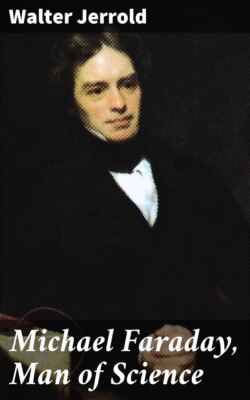Michael Faraday, Man of Science

Реклама. ООО «ЛитРес», ИНН: 7719571260.
Оглавление
Walter Jerrold. Michael Faraday, Man of Science
Michael Faraday, Man of Science
Table of Contents
PREFACE
CHAPTER I. As Child—Newsboy and Bookbinder
CHAPTER II. The Turning Point
CHAPTER III "Home Thoughts from Abroad."
CHAPTER IV. Back at Work
CHAPTER V "Science which I Loved."
CHAPTER VI. As Teacher and Preacher
CHAPTER VII. Overwork—The End
CHAPTER VIII. As Friend and Lecturer
CHAPTER IX. Notes on His Work
CHAPTER X. About the Royal Institution
FOOTNOTES:
Отрывок из книги
Walter Jerrold
Published by Good Press, 2019
.....
Thus ambitiously did Michael Faraday, a youth of not yet twenty years, start upon his career as an investigator; thus early did he evince a desire to "corroborate or invalidate those theories which are continually starting into the world of science." Among books and articles to which reference is made in the interesting Miscellany, there are papers by Dr. Darwin,[1] papers on a "Description of a Pyro-pneumatic Apparatus," and "Experiment on the Ocular Spectra of Light and Colours," frequent references to "lightning," "electric fish," and other electrical phenomena, showing his early leaning towards this particular branch of investigation. There is a reference to the short essay on the Formation of Snow, which forms the reading for December 5th, in that interesting, and at the present time neglected, work, Sturm's Reflections on the Works of God. This book has perhaps been supplanted in a great measure by the many popular treatises on science and natural history which recent years have produced, but which, nevertheless, have not taken the place of the Reflections, the simplicity and directness of which give to the volume a perennial charm such as but few books can maintain. Other papers, such as that on "How to Loosen Glass Stopples," included in the Miscellany, show us Faraday's interest in the science of everyday life, to which in his later years we owe those delightfully interesting lectures on "The Chemical History of a Candle," lectures to which fuller reference is made later on in this volume. One other reference in the Miscellany is at any rate worthy of passing note for obvious reasons, or for reasons which are obvious as soon as we learn how closely connected is the career of Faraday with that of his great benefactor and predecessor in the field of research, Sir Humphry Davy. The reference is from the Chemical Observer, to the effect that "Mr. Davy (he was knighted in 1812) has announced to the Royal Society a great discovery in chemistry—the fixed alkalies have been decomposed by the galvanic battery."
From the lectures at Mr. Tatum's house our young philosopher gained something more than a knowledge of the subjects discussed—he gained several friends, intercourse and exchange of ideas with whom were to form no inconsiderable part of his education; that he might illustrate the lectures, too, he set to study perspective, being kindly assisted in his work by Mr. Masquarier, a French refugee artist who was lodging at the time at Mr. Riebau's, and whose kindness to him Faraday never in after years forgot to acknowledge. About a dozen lectures at Mr. Tatum's were spread over rather more than eighteen months (February, 1810—September, 1811). At them, Faraday became acquainted with Benjamin Abbott, a confidential clerk in the City—an acquaintance that ripened into life-long friendship; here also he met Huxtable, a medical student, to whom he addressed the earliest note of his which is extant. Other kindred spirits with whom Faraday entered into friendly relations at the Dorset Street lectures, were Magrath, Newton, Nichol, and many more. There is a perverted and ridiculous story told of Faraday's first hearing Davy lecture, to the effect that "Magrath happening, many years ago, to enter the shop of Mr. Riebau, observed one of the bucks of the paper bonnet zealously studying a book which he ought to have been binding. He approached; it was a volume of the old Britannica, open at 'Electricity.' He entered into talk with the journeyman, and was astonished to find in him a self-taught chemist, of no slender pretensions. He presented him with a set of tickets for Davy's lectures at the Royal Institution; and daily thereafter might the nondescript be seen perched, pen in hand, and his eyes starting out of his head, just over the clock opposite the chair. At last the course terminated; but Faraday's spirit had received a new impulse, which nothing but dire necessity could have restrained." This circumstantial yet exaggerated story, couched as it is in the worst of tastes, is yet quoted with approval in a recent work supposed of some authority.
.....